Reflective Learning: Applying Gibbs Model to Improve Management
VerifiedAdded on 2019/12/28
|5
|1399
|206
Essay
AI Summary
This essay delves into the concept of reflective learning, emphasizing its significance in enhancing knowledge, emotional intelligence, and societal dimensions. It introduces the Gibbs Reflective Model as a tool for self-assessment, skill development, and improved managerial practices. The author reflects on their personal experiences, highlighting the importance of emotional intelligence, team management, and the ability to manage oneself and others. The essay underscores the value of identifying team members' strengths, understanding their emotions, and fostering effective communication to achieve individual and organizational goals. The application of the Gibbs model is discussed in the context of improving managerial skills, promoting better working conditions, and achieving desired outcomes within a business setting. The essay concludes by emphasizing the importance of continuous self-evaluation, understanding diverse perspectives, and adapting managerial approaches to meet the needs of the team and achieve business objectives.
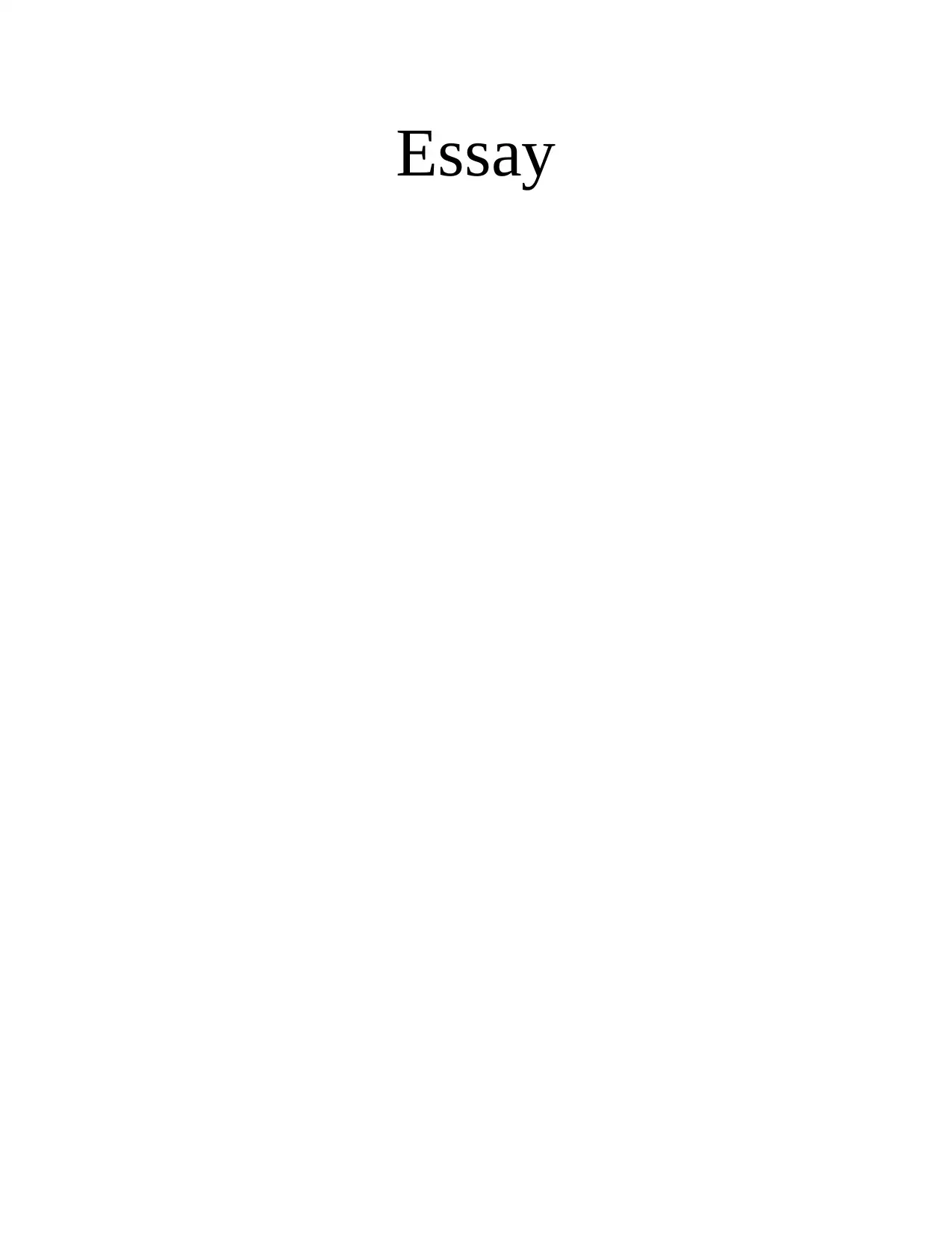
Essay
Paraphrase This Document
Need a fresh take? Get an instant paraphrase of this document with our AI Paraphraser
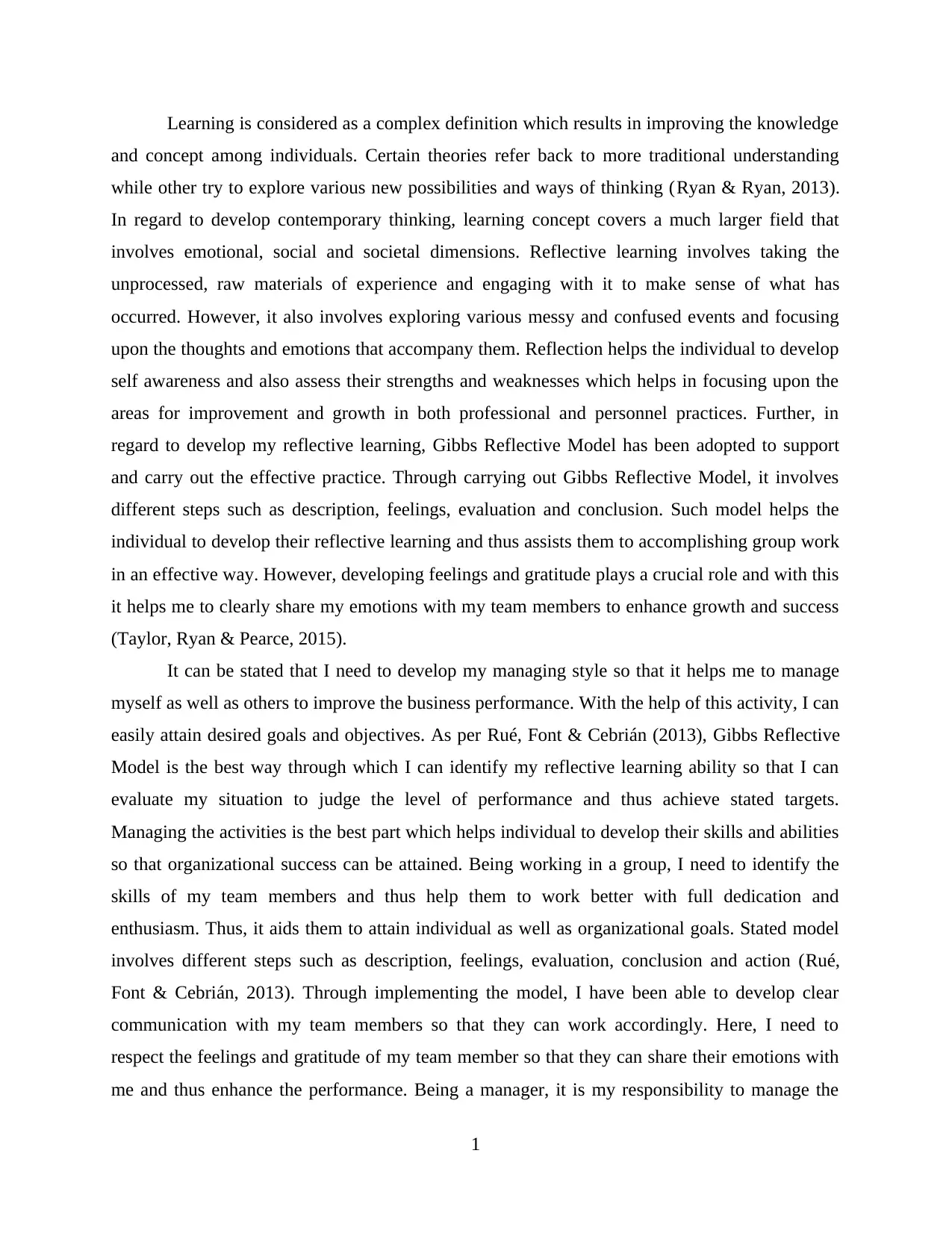
Learning is considered as a complex definition which results in improving the knowledge
and concept among individuals. Certain theories refer back to more traditional understanding
while other try to explore various new possibilities and ways of thinking (Ryan & Ryan, 2013).
In regard to develop contemporary thinking, learning concept covers a much larger field that
involves emotional, social and societal dimensions. Reflective learning involves taking the
unprocessed, raw materials of experience and engaging with it to make sense of what has
occurred. However, it also involves exploring various messy and confused events and focusing
upon the thoughts and emotions that accompany them. Reflection helps the individual to develop
self awareness and also assess their strengths and weaknesses which helps in focusing upon the
areas for improvement and growth in both professional and personnel practices. Further, in
regard to develop my reflective learning, Gibbs Reflective Model has been adopted to support
and carry out the effective practice. Through carrying out Gibbs Reflective Model, it involves
different steps such as description, feelings, evaluation and conclusion. Such model helps the
individual to develop their reflective learning and thus assists them to accomplishing group work
in an effective way. However, developing feelings and gratitude plays a crucial role and with this
it helps me to clearly share my emotions with my team members to enhance growth and success
(Taylor, Ryan & Pearce, 2015).
It can be stated that I need to develop my managing style so that it helps me to manage
myself as well as others to improve the business performance. With the help of this activity, I can
easily attain desired goals and objectives. As per Rué, Font & Cebrián (2013), Gibbs Reflective
Model is the best way through which I can identify my reflective learning ability so that I can
evaluate my situation to judge the level of performance and thus achieve stated targets.
Managing the activities is the best part which helps individual to develop their skills and abilities
so that organizational success can be attained. Being working in a group, I need to identify the
skills of my team members and thus help them to work better with full dedication and
enthusiasm. Thus, it aids them to attain individual as well as organizational goals. Stated model
involves different steps such as description, feelings, evaluation, conclusion and action (Rué,
Font & Cebrián, 2013). Through implementing the model, I have been able to develop clear
communication with my team members so that they can work accordingly. Here, I need to
respect the feelings and gratitude of my team member so that they can share their emotions with
me and thus enhance the performance. Being a manager, it is my responsibility to manage the
1
and concept among individuals. Certain theories refer back to more traditional understanding
while other try to explore various new possibilities and ways of thinking (Ryan & Ryan, 2013).
In regard to develop contemporary thinking, learning concept covers a much larger field that
involves emotional, social and societal dimensions. Reflective learning involves taking the
unprocessed, raw materials of experience and engaging with it to make sense of what has
occurred. However, it also involves exploring various messy and confused events and focusing
upon the thoughts and emotions that accompany them. Reflection helps the individual to develop
self awareness and also assess their strengths and weaknesses which helps in focusing upon the
areas for improvement and growth in both professional and personnel practices. Further, in
regard to develop my reflective learning, Gibbs Reflective Model has been adopted to support
and carry out the effective practice. Through carrying out Gibbs Reflective Model, it involves
different steps such as description, feelings, evaluation and conclusion. Such model helps the
individual to develop their reflective learning and thus assists them to accomplishing group work
in an effective way. However, developing feelings and gratitude plays a crucial role and with this
it helps me to clearly share my emotions with my team members to enhance growth and success
(Taylor, Ryan & Pearce, 2015).
It can be stated that I need to develop my managing style so that it helps me to manage
myself as well as others to improve the business performance. With the help of this activity, I can
easily attain desired goals and objectives. As per Rué, Font & Cebrián (2013), Gibbs Reflective
Model is the best way through which I can identify my reflective learning ability so that I can
evaluate my situation to judge the level of performance and thus achieve stated targets.
Managing the activities is the best part which helps individual to develop their skills and abilities
so that organizational success can be attained. Being working in a group, I need to identify the
skills of my team members and thus help them to work better with full dedication and
enthusiasm. Thus, it aids them to attain individual as well as organizational goals. Stated model
involves different steps such as description, feelings, evaluation, conclusion and action (Rué,
Font & Cebrián, 2013). Through implementing the model, I have been able to develop clear
communication with my team members so that they can work accordingly. Here, I need to
respect the feelings and gratitude of my team member so that they can share their emotions with
me and thus enhance the performance. Being a manager, it is my responsibility to manage the
1
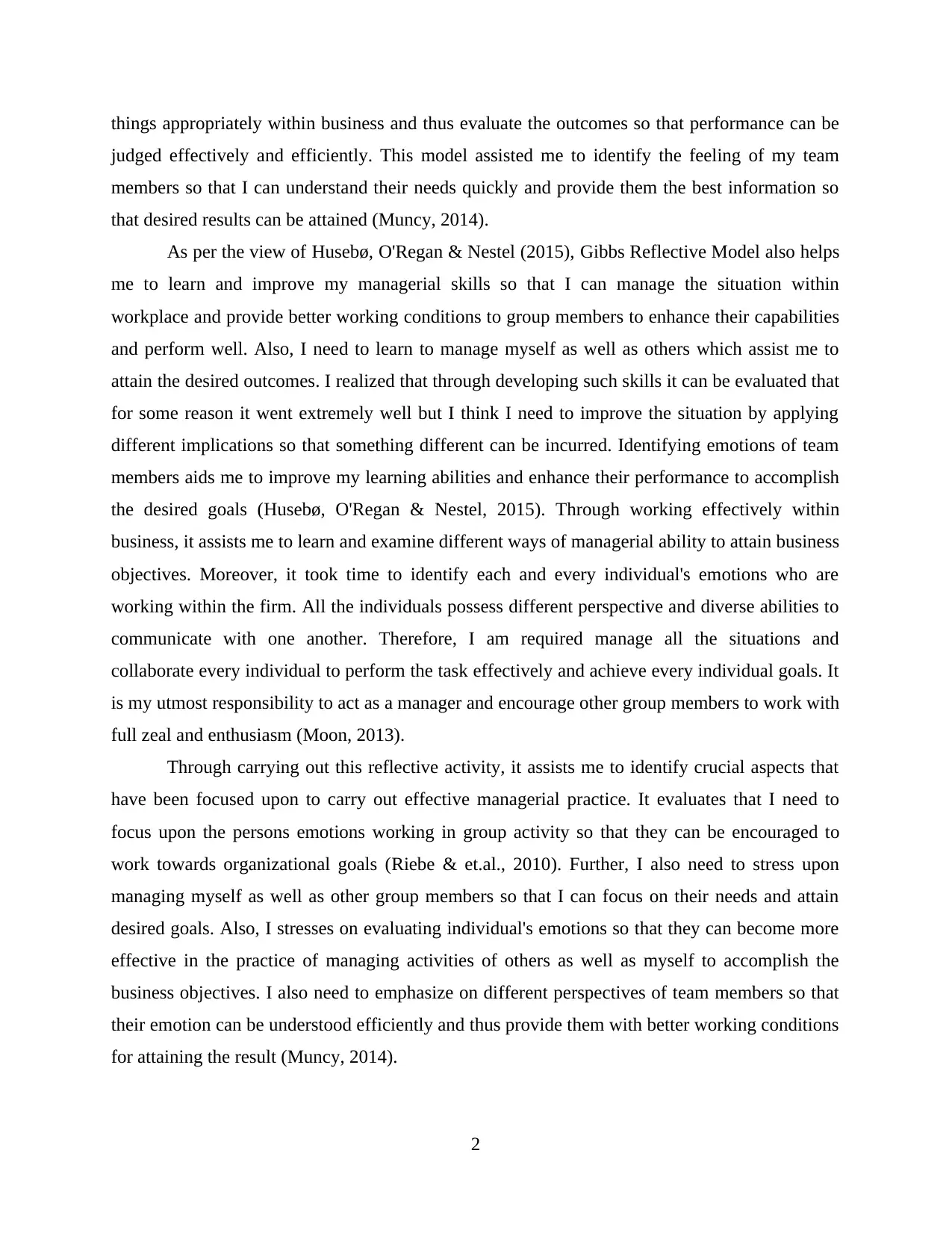
things appropriately within business and thus evaluate the outcomes so that performance can be
judged effectively and efficiently. This model assisted me to identify the feeling of my team
members so that I can understand their needs quickly and provide them the best information so
that desired results can be attained (Muncy, 2014).
As per the view of Husebø, O'Regan & Nestel (2015), Gibbs Reflective Model also helps
me to learn and improve my managerial skills so that I can manage the situation within
workplace and provide better working conditions to group members to enhance their capabilities
and perform well. Also, I need to learn to manage myself as well as others which assist me to
attain the desired outcomes. I realized that through developing such skills it can be evaluated that
for some reason it went extremely well but I think I need to improve the situation by applying
different implications so that something different can be incurred. Identifying emotions of team
members aids me to improve my learning abilities and enhance their performance to accomplish
the desired goals (Husebø, O'Regan & Nestel, 2015). Through working effectively within
business, it assists me to learn and examine different ways of managerial ability to attain business
objectives. Moreover, it took time to identify each and every individual's emotions who are
working within the firm. All the individuals possess different perspective and diverse abilities to
communicate with one another. Therefore, I am required manage all the situations and
collaborate every individual to perform the task effectively and achieve every individual goals. It
is my utmost responsibility to act as a manager and encourage other group members to work with
full zeal and enthusiasm (Moon, 2013).
Through carrying out this reflective activity, it assists me to identify crucial aspects that
have been focused upon to carry out effective managerial practice. It evaluates that I need to
focus upon the persons emotions working in group activity so that they can be encouraged to
work towards organizational goals (Riebe & et.al., 2010). Further, I also need to stress upon
managing myself as well as other group members so that I can focus on their needs and attain
desired goals. Also, I stresses on evaluating individual's emotions so that they can become more
effective in the practice of managing activities of others as well as myself to accomplish the
business objectives. I also need to emphasize on different perspectives of team members so that
their emotion can be understood efficiently and thus provide them with better working conditions
for attaining the result (Muncy, 2014).
2
judged effectively and efficiently. This model assisted me to identify the feeling of my team
members so that I can understand their needs quickly and provide them the best information so
that desired results can be attained (Muncy, 2014).
As per the view of Husebø, O'Regan & Nestel (2015), Gibbs Reflective Model also helps
me to learn and improve my managerial skills so that I can manage the situation within
workplace and provide better working conditions to group members to enhance their capabilities
and perform well. Also, I need to learn to manage myself as well as others which assist me to
attain the desired outcomes. I realized that through developing such skills it can be evaluated that
for some reason it went extremely well but I think I need to improve the situation by applying
different implications so that something different can be incurred. Identifying emotions of team
members aids me to improve my learning abilities and enhance their performance to accomplish
the desired goals (Husebø, O'Regan & Nestel, 2015). Through working effectively within
business, it assists me to learn and examine different ways of managerial ability to attain business
objectives. Moreover, it took time to identify each and every individual's emotions who are
working within the firm. All the individuals possess different perspective and diverse abilities to
communicate with one another. Therefore, I am required manage all the situations and
collaborate every individual to perform the task effectively and achieve every individual goals. It
is my utmost responsibility to act as a manager and encourage other group members to work with
full zeal and enthusiasm (Moon, 2013).
Through carrying out this reflective activity, it assists me to identify crucial aspects that
have been focused upon to carry out effective managerial practice. It evaluates that I need to
focus upon the persons emotions working in group activity so that they can be encouraged to
work towards organizational goals (Riebe & et.al., 2010). Further, I also need to stress upon
managing myself as well as other group members so that I can focus on their needs and attain
desired goals. Also, I stresses on evaluating individual's emotions so that they can become more
effective in the practice of managing activities of others as well as myself to accomplish the
business objectives. I also need to emphasize on different perspectives of team members so that
their emotion can be understood efficiently and thus provide them with better working conditions
for attaining the result (Muncy, 2014).
2
⊘ This is a preview!⊘
Do you want full access?
Subscribe today to unlock all pages.

Trusted by 1+ million students worldwide
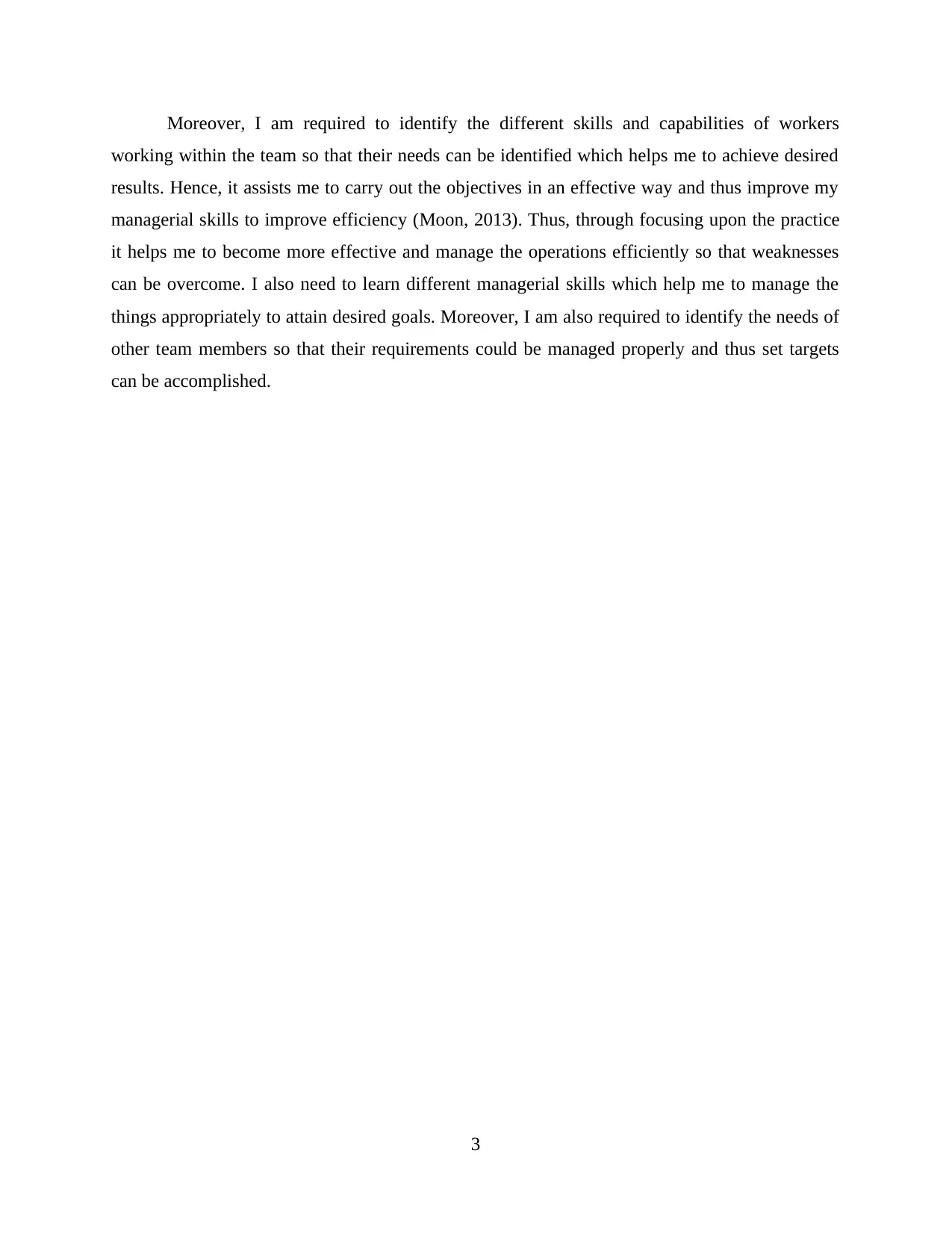
Moreover, I am required to identify the different skills and capabilities of workers
working within the team so that their needs can be identified which helps me to achieve desired
results. Hence, it assists me to carry out the objectives in an effective way and thus improve my
managerial skills to improve efficiency (Moon, 2013). Thus, through focusing upon the practice
it helps me to become more effective and manage the operations efficiently so that weaknesses
can be overcome. I also need to learn different managerial skills which help me to manage the
things appropriately to attain desired goals. Moreover, I am also required to identify the needs of
other team members so that their requirements could be managed properly and thus set targets
can be accomplished.
3
working within the team so that their needs can be identified which helps me to achieve desired
results. Hence, it assists me to carry out the objectives in an effective way and thus improve my
managerial skills to improve efficiency (Moon, 2013). Thus, through focusing upon the practice
it helps me to become more effective and manage the operations efficiently so that weaknesses
can be overcome. I also need to learn different managerial skills which help me to manage the
things appropriately to attain desired goals. Moreover, I am also required to identify the needs of
other team members so that their requirements could be managed properly and thus set targets
can be accomplished.
3
Paraphrase This Document
Need a fresh take? Get an instant paraphrase of this document with our AI Paraphraser
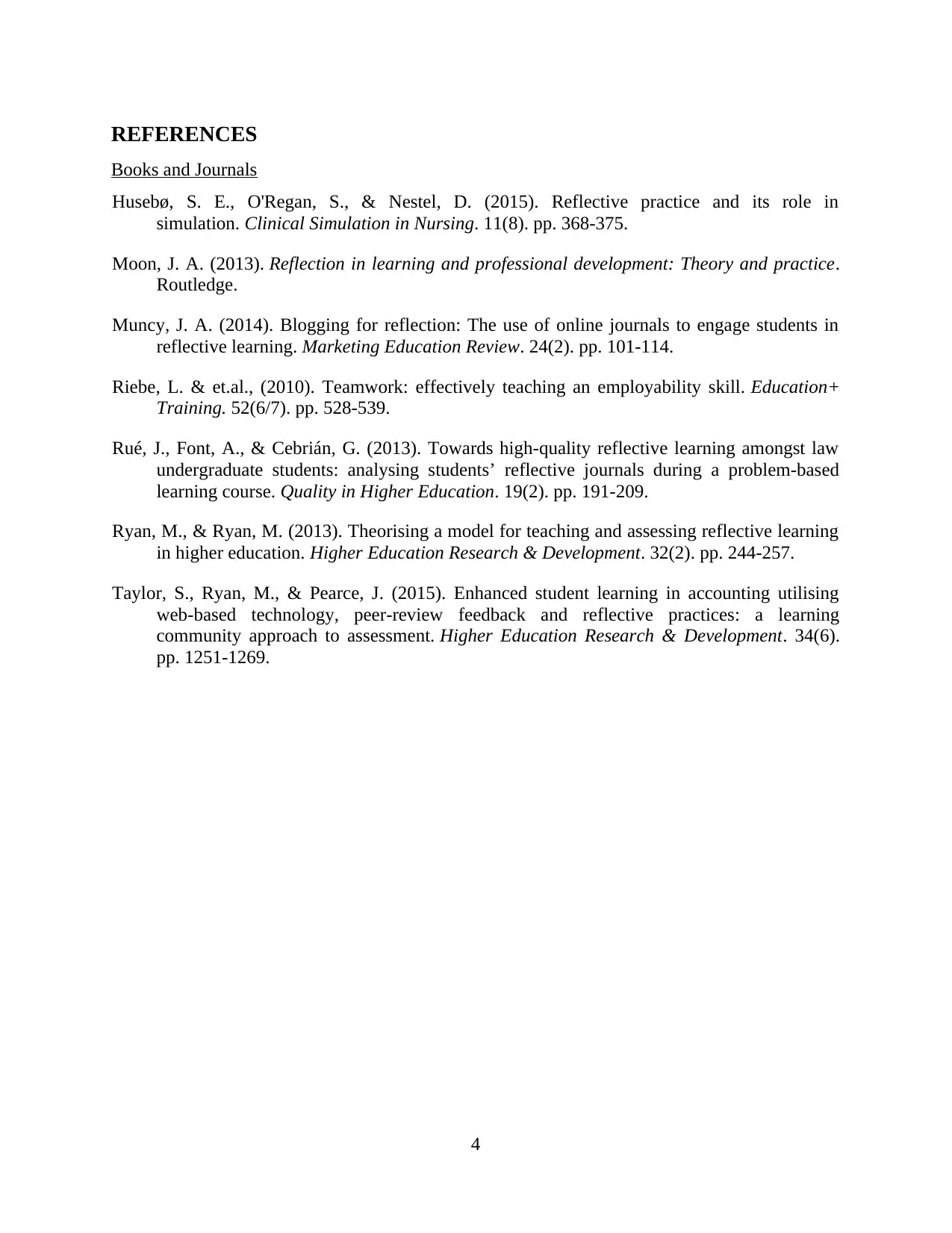
REFERENCES
Books and Journals
Husebø, S. E., O'Regan, S., & Nestel, D. (2015). Reflective practice and its role in
simulation. Clinical Simulation in Nursing. 11(8). pp. 368-375.
Moon, J. A. (2013). Reflection in learning and professional development: Theory and practice.
Routledge.
Muncy, J. A. (2014). Blogging for reflection: The use of online journals to engage students in
reflective learning. Marketing Education Review. 24(2). pp. 101-114.
Riebe, L. & et.al., (2010). Teamwork: effectively teaching an employability skill. Education+
Training. 52(6/7). pp. 528-539.
Rué, J., Font, A., & Cebrián, G. (2013). Towards high-quality reflective learning amongst law
undergraduate students: analysing students’ reflective journals during a problem-based
learning course. Quality in Higher Education. 19(2). pp. 191-209.
Ryan, M., & Ryan, M. (2013). Theorising a model for teaching and assessing reflective learning
in higher education. Higher Education Research & Development. 32(2). pp. 244-257.
Taylor, S., Ryan, M., & Pearce, J. (2015). Enhanced student learning in accounting utilising
web-based technology, peer-review feedback and reflective practices: a learning
community approach to assessment. Higher Education Research & Development. 34(6).
pp. 1251-1269.
4
Books and Journals
Husebø, S. E., O'Regan, S., & Nestel, D. (2015). Reflective practice and its role in
simulation. Clinical Simulation in Nursing. 11(8). pp. 368-375.
Moon, J. A. (2013). Reflection in learning and professional development: Theory and practice.
Routledge.
Muncy, J. A. (2014). Blogging for reflection: The use of online journals to engage students in
reflective learning. Marketing Education Review. 24(2). pp. 101-114.
Riebe, L. & et.al., (2010). Teamwork: effectively teaching an employability skill. Education+
Training. 52(6/7). pp. 528-539.
Rué, J., Font, A., & Cebrián, G. (2013). Towards high-quality reflective learning amongst law
undergraduate students: analysing students’ reflective journals during a problem-based
learning course. Quality in Higher Education. 19(2). pp. 191-209.
Ryan, M., & Ryan, M. (2013). Theorising a model for teaching and assessing reflective learning
in higher education. Higher Education Research & Development. 32(2). pp. 244-257.
Taylor, S., Ryan, M., & Pearce, J. (2015). Enhanced student learning in accounting utilising
web-based technology, peer-review feedback and reflective practices: a learning
community approach to assessment. Higher Education Research & Development. 34(6).
pp. 1251-1269.
4
1 out of 5
Related Documents
Your All-in-One AI-Powered Toolkit for Academic Success.
+13062052269
info@desklib.com
Available 24*7 on WhatsApp / Email
![[object Object]](/_next/static/media/star-bottom.7253800d.svg)
Unlock your academic potential
Copyright © 2020–2026 A2Z Services. All Rights Reserved. Developed and managed by ZUCOL.





